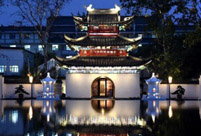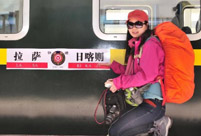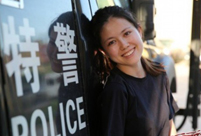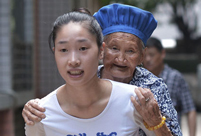 YOG kicks off in Nanjing
YOG kicks off in Nanjing
 Colorful life at Youth Olympic Village of Nanjing 2014 YOG
Colorful life at Youth Olympic Village of Nanjing 2014 YOG
 Royal Taoist temple to open to public
Royal Taoist temple to open to public
 Female soldiers at quake-hit area
Female soldiers at quake-hit area
 Shocking photos of cruel battles in Ukraine
Shocking photos of cruel battles in Ukraine
 Amphibious armored vehicle unit conducts open sea drill
Amphibious armored vehicle unit conducts open sea drill
 Water relay in Henan
Water relay in Henan
 Ethnic culture feasts eyes of travelers
Ethnic culture feasts eyes of travelers
 80 security dogs assembled in Nanjing police dog training base
80 security dogs assembled in Nanjing police dog training base
 Graffiti artists paint on street walls in Xinjiang
Graffiti artists paint on street walls in Xinjiang
SEOUL, Aug. 21 -- South Korea and China have upgraded the bilateral partnership since the two nations set up diplomatic relations in 1992, especially on areas of trade, finance and culture, a South Korean think tank said Thursday.
After Chinese President Xi Jinping visited Seoul in July, the neighbors strengthened their strategic cooperative partnership, upgrading the quality of bilateral economic cooperation and widening communication channels both politically and diplomatically, the Hyundai Research Institute (HRI) said in a report.
The report said Xi's visit to South Korea drove Seoul and Beijing to enter a new era of "politically warmer and economically hotter," noting that it would be meaningful as this year marks the 22nd anniversary of establishing diplomatic ties on Aug. 24, 1992.
Since that day, trade between South Korea and China surged some 36-fold from 6.4 billion U.S. dollars in 1992 to 228.9 billion dollars in 2013, equaling to an annual average increase of 19 percent.
China has become South Korea's largest trade partner since 2004, and in 2013, South Korea was China's fourth-largest partner for trade.
The bilateral trade has been qualitatively upgraded as main trade items changed from low value-added products such as textiles and cement to high-end goods, including semiconductors, synthetic resins and oil products.
Financial and monetary cooperation has been strengthened. Central banks of the two countries signed a currency swap deal worth 180 billion yuan (about 29 billion U.S. dollars) in December 2008, before expanding the contract to 360 billion yuan in October 2011. Also, the countries agreed to open a market to trade their currencies directly in Seoul as early as within this year.
Cultural exchanges continued to widen. Personnel exchange between the two countries expanded more than 87-fold since the diplomatic normalization, from 90,000 in 1992 to 7.89 million in 2013. A total of 3.97 million South Koreans visited China last year, and 433 million Chinese toured South Korea.
South Korea's exports of cultural contents, including K-Pop or soap opera, to China rose from 581 million dollars in 2009 to 1.29 billion dollars in 2012, equivalent to an annual average expansion of 28.4 percent. The portion of content exports to China accounted for 27.6 percent of the total in 2012, up from 24.5 percent in 2010.
 Beautiful night scenery of Nanjing
Beautiful night scenery of Nanjing Passenger transport starts on Tibet's new railway
Passenger transport starts on Tibet's new railway Story of outstanding Beijing swat sniper
Story of outstanding Beijing swat sniper Beautiful policewoman in an anti-terrorism SWAT team
Beautiful policewoman in an anti-terrorism SWAT team Cute photos of little Taoist nuns and monks go viral online
Cute photos of little Taoist nuns and monks go viral online Amphibious armored vehicle unit conducts open sea drill
Amphibious armored vehicle unit conducts open sea drill A post-90s girl who takes grandma to work
A post-90s girl who takes grandma to work Beijing policewomen posters become a hit
Beijing policewomen posters become a hit The vanishing folk skills
The vanishing folk skills Intoxicating beauty of Dali, Yunnan province
Intoxicating beauty of Dali, Yunnan province Memorable moments of Ludian earthquake
Memorable moments of Ludian earthquake Bring world together to help elephant
Bring world together to help elephant 'Building Dreams'
'Building Dreams'  Labrang Monastery
Labrang MonasteryDay|Week|Month